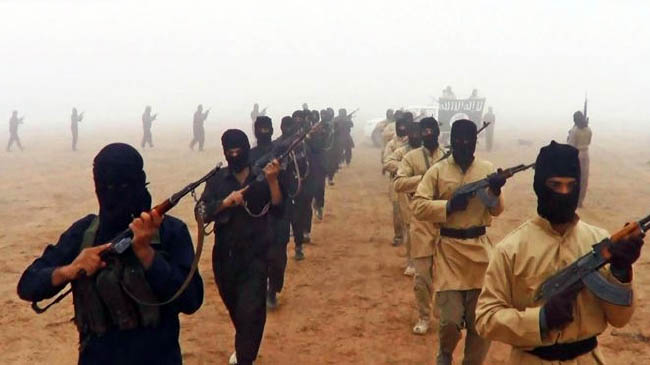The self-proclaimed Islamic State of Iraq and the Levant (ISIL) is a serious challenge and seeks to destabilize the world through spilling the blood of people on the grounds of their racial and religious backgrounds. This group, which spreads fear and hatred, is sowing the seeds of sectarianism around the globe. Their warped mind increases the pains and sufferings of mankind. The flagrant violation of human rights, as a result of terrorism and militancy, is a great tragedy. Surviving war and violence that originates from the parochial mindsets and radical ideology is considered luck, mainly in war-torn countries.
Donald J Trump claimed in his inaugural speech on Friday to “unite the civilized world against radical Islamic terrorism, which we will eradicate completely from the face of the earth.” In order to “defeat and destroy” ISIL and similar groups, the new administration said it “will pursue aggressive joint and coalition military operations when necessary,” work to cut off funding for terrorist groups, expand intelligence sharing, and use “cyber warfare” to disrupt propaganda and recruitment efforts.
The highly destructive role of the ISIL group in Syria is an unmistakable fact. In addition to killing men, women and children in cold blood, the group destroys historical monuments. Of late, the ISIL fighters have reportedly demolished the facade of a second-century Roman amphitheater and another ancient monument in the historic city of Palmyra, Syria. The smashing of the ancient structures was a further attempt by the group to impose its will by destroying monuments or artifacts that it says do not conform to its strict interpretation of religious tenets. Celebrated as the “Pearl of the Desert,” Palmyra, about 150 miles northeast of Damascus, was once a refuge for travelers on the Silk Road, the ancient trade route. Temples have stood in Palmyra for thousands of years. The group’s demolition of historic sites in Iraq, Libya, Syria, and elsewhere has drawn international opprobrium; UNESCO has branded the actions “cultural cleansing.”
No wonder, the US is strongly involved in Syria’s issue and it is a great challenge ahead of Trump’s administration. Seemingly, the US increases its combat mission in Syria. Pentagon said, on Friday, that an Air Force B-52 bomber carried out a punishing airstrike against a training camp of Al Qaeda west of Aleppo which killed more than 100 fighters. It was the second major strike carried out by American warplanes in Mr. Obama’s waning hours in the White House.
The airstrike was condemned by the Syrian opposition group Jabhat Fateh al-Sham, which complained that the camp for new recruits was one of theirs and that the practical effect would be to eliminate fighters who are confronting Bashar al-Assad, the Syrian leader. Jabhat Fateh al-Sham, formerly known as the Nusra Front, claims to have broken with Al Qaeda, but American officials say they are still a Qaeda affiliate. “America chose to confront the Syrian people and their mujahedeen,” the group said in a statement.
On Thursday, the Pentagon disclosed that it had carried out an airstrike on Tuesday in Idlib Province that killed Mohammad Habib Boussadoun al-Tunisi, whom it described a Qaeda leader linked to plots against Western targets.
A bona fide intention for eradicating the terrorist groups is highly appreciable. It should be noted that the ISIL seeks “revenge” through any possible means and gross violation of human rights. And the issue is very complicated in Syria. That is to say, the militant fighters are supported by a mysterious hand since it shows backlash for losing the ground in Mosul and Aleppo. The recapture of Mosul is likely to end the group's self-styled caliphate in it areas seized in 2014; however ISIL would still be capable of fighting a guerrilla-style insurgency in Iraq. Although ISIL fighters are hugely outnumbered in Mosul, they have spread themselves among the city’s residents, hindering government forces who are attempting to avoid civilian casualties. After all, the group is widely involved in humanitarian law and kills non-combatants in the worst possible way. In a nutshell, the terrorist elements have crossed the red line and pay no heed to humanity, religious tenets or international law. Additionally, they destroy cultural monuments, which have nothing to do with wars.
To safeguard human rights, the world will have to broker and support peace talks between the Syrian’s government and opposition group. Hundreds of thousands were killed and more than half of the country’s population has been displaced as a result of Syria’s conflict erupted on March, 2011 with protests against Assad’s regime. The ISIL has capitalized on the turbulence and seeks to muddy the water as long as possible. Syria’s Prime Minister Imad Khamis said that his government was serious about the Syrian talks in Astana, noting that Damascus welcomes any initiative to restore peace. The talks in Astana are the result of a Russian-Turkish understanding, which started with a ceasefire in the country, which excluded terror-designated groups such as the al-Qaeda-linked Nusra Front and the ISIL group.
The germ of idea for holding talks for Syria’s conflict is a wise decision and hope the world supports it so as to strengthen peace and stability and put an end to the deadly conflict of Syria. Secondly, excluding the ISIL and al-Qaeda is wiser one and they have to be countered and eradicated. Let us see how Mr. Trump will play his role as US president.

